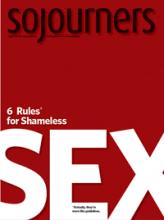AFTER MORE THAN two decades of being married, birthing and adopting children, and teaching two college sexuality courses, I have come to the not-terribly-startling conclusion that I’m rather fond of sex. I delight in talking about sexuality, engaging sexually with my spouse, reading about sexuality, and walking alongside students as they come to grips with their own sexual passions and convictions.
I begin here because Christians have only recently emerged from a somewhat anti-sexual period in church history in which the words “sex” and “sin” have been so closely united in Christian thinking that many of the faithful regard them as synonymous.
This sex-negativity has deep roots, origins that begin with several early church scholars, who saw humans as divided beings consisting of a spiritual part that was good (the mind or soul) and a physical part (the body) that was bad. Such dualism also went hand in glove with the denigration of women, who were seen as more bodily because they became pregnant, lactated, menstruated, and otherwise needed to be more aware of their bodily nature.
During the patristic period and early Middle Ages, sexuality increasingly was perceived as problematic. This is especially clear in the requirements prescribed for various sins in the late medieval English penitentials. The penitentials prescribe 10 years of penance for coitus interruptus and lifelong penance for oral sex. But the same guidelines require only seven years of penance for premeditated murder. Hmm—something seems amiss.
Yet our sacred text is filled with stories about sexuality. Occasionally when people are trying to ban books from public classrooms, someone reminds school officials how much sex is in the Bible: foreplay, adulterous affairs, polygamy, sexy descriptions of lovers’ bodies, heterosexual and homosexual rapes, sexual frolicking, and concern about sacred temple sex in the surrounding culture.
In more than just biblical ways, our spirituality and sexuality are deeply intertwined. Theologically speaking, human sexuality is “most fundamentally the divine invitation to find our destinies not in loneliness but in deep connection,” write James B. Nelson and Sandra P. Longfellow. That yearning for connection is expressed not just genitally but with our whole selves, with intellectual and emotional passion. We need other people, and are drawn to them, just as we are drawn to God.
For the church, the recent recognition that sexuality and spirituality are intertwined, and that the biblical text is not afraid to talk openly about sexuality, has been life-giving.
But while these insights have been a breath of fresh air, sometimes they also have encouraged a certain naiveté or excessive optimism about our sexual selves.
Somewhere between the earlier demonization of sexuality and our current movement toward celebrating something passing itself off as “sexual freedom” must be a healthy balance, a middle way—no, a higher way. That higher, redemptive way must be informed by both the positive affirmation of sexuality as God’s good gift, on the one hand, and on the other hand our capacity for the sexual exploitation of each other.
Perhaps what we ought to call for, then, is a countercultural way of living, not like the sexually repressive way of previous decades but one with an open, positive view toward sexuality—and a clear witness against the abuses of this remarkable gift of God. I want to very tentatively propose some of what this might look like: a redemptive sexual counterculture, a way to both love sexuality and live faithfully.
Read the Full Article

